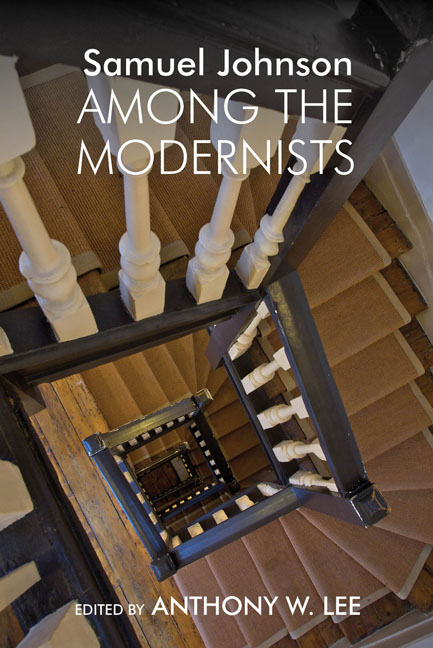Book contents
- Frontmatter
- Contents
- Acknowledgments
- Short Titles
- Abbreviations
- Introduction: Modernity Johnson?
- 1 Johnson, T. S. Eliot, and the City
- 2 “Saint Samuel of Fleet Street”: Johnson and Woolf
- 3 “Intellectually ‘Fuori del Mondo‘”: Pound's Johnson
- 4 The Antinomies of Progress: Johnson, Conrad, Joyce
- 5 Johnson Goes to War
- 6 Samuel Beckett and Samuel Johnson: Like-minded Masters of Life's Limitations
- 7 The “Plexed Artistry” of Nabokov and Johnson
- 8 Johnson and Borges: Some Reflections
- 9 Ernest Borneman's Tomorrow Is Now (1959): Thoughts about a Lost Novel, with Glances toward Samuel Johnson and other Modernists
- Notes
- Contributors
- Index
7 - The “Plexed Artistry” of Nabokov and Johnson
- Frontmatter
- Contents
- Acknowledgments
- Short Titles
- Abbreviations
- Introduction: Modernity Johnson?
- 1 Johnson, T. S. Eliot, and the City
- 2 “Saint Samuel of Fleet Street”: Johnson and Woolf
- 3 “Intellectually ‘Fuori del Mondo‘”: Pound's Johnson
- 4 The Antinomies of Progress: Johnson, Conrad, Joyce
- 5 Johnson Goes to War
- 6 Samuel Beckett and Samuel Johnson: Like-minded Masters of Life's Limitations
- 7 The “Plexed Artistry” of Nabokov and Johnson
- 8 Johnson and Borges: Some Reflections
- 9 Ernest Borneman's Tomorrow Is Now (1959): Thoughts about a Lost Novel, with Glances toward Samuel Johnson and other Modernists
- Notes
- Contributors
- Index
Summary
Introduction
Beginning in the epigraph of his 1962 experimental novel Pale Fire, Vladimir Nabokov repeatedly invokes Samuel Johnson as a figure of powerful fascination and literary envy. The metanarrative of Pale Fire, throughout John Shade's poem and Charles Kinbote's commentary, is a painful search for meaning in the seemingly random coincidences produced in the depressive or paranoid mind. The poet, devoted to the search for Enlightenment-style objectivity, is tortured by his irrepressibly sublime imagination, while the commentator grafts his own mad certainties into the rootstock of Shade's hard-won epiphanies. This tension, between induction and deduction, between skepticism and zeal, is central to Nabokov's fiction, but it also serves as a crucial commentary on the literary, critical, and linguistic inquiries of Samuel Johnson.
Analytical comparisons of Nabokov and Johnson tend to begin with the surface dissimilarities between them in terms of content and reputation. As Jeffrey Meyers puts it, Johnson was a didactic moralist and patriot, while Nabokov is “the embodiment of the witty, urbane, and cosmopolitan modern writer.” It strikes literary critics as strange that Nabokov, the author of several novels about pedophilia, incest, suicide, and murder, would invoke the morally conservative Johnson not just as an influence on a character but as an influence on his own ideas about language, poetry, and meaning.
Just as Samuel Johnson seems simultaneously to be an avatar for eighteenth- century British aesthetics, ideas, and values, while having explicitly resisted most of the Enlightenment's core ideas and principles, Vladimir Nabokov wrote several quintessentially twentieth-century American novels, though he did not identify as American, a novelist by vocation, or even a person sharing an era with his contemporaries. Both writers were irascible eccentrics who, after living much of their lives working in obscurity, nevertheless found themselves suddenly identified as cultural insiders, icons of literary wisdom to readers of popular fiction and the educated elite alike.
Johnson and Nabokov both wrote in styles that struck readers as old-fashioned in their own times, resistant to the tremendous aesthetic shifts that their contemporaries had embraced. Yet their works ultimately demonstrate not sentimentality about idealized times past but a kind of bruised wariness about trends in intellectual innovation.
- Type
- Chapter
- Information
- Samuel Johnson Among the Modernists , pp. 165 - 188Publisher: Liverpool University PressPrint publication year: 2019

